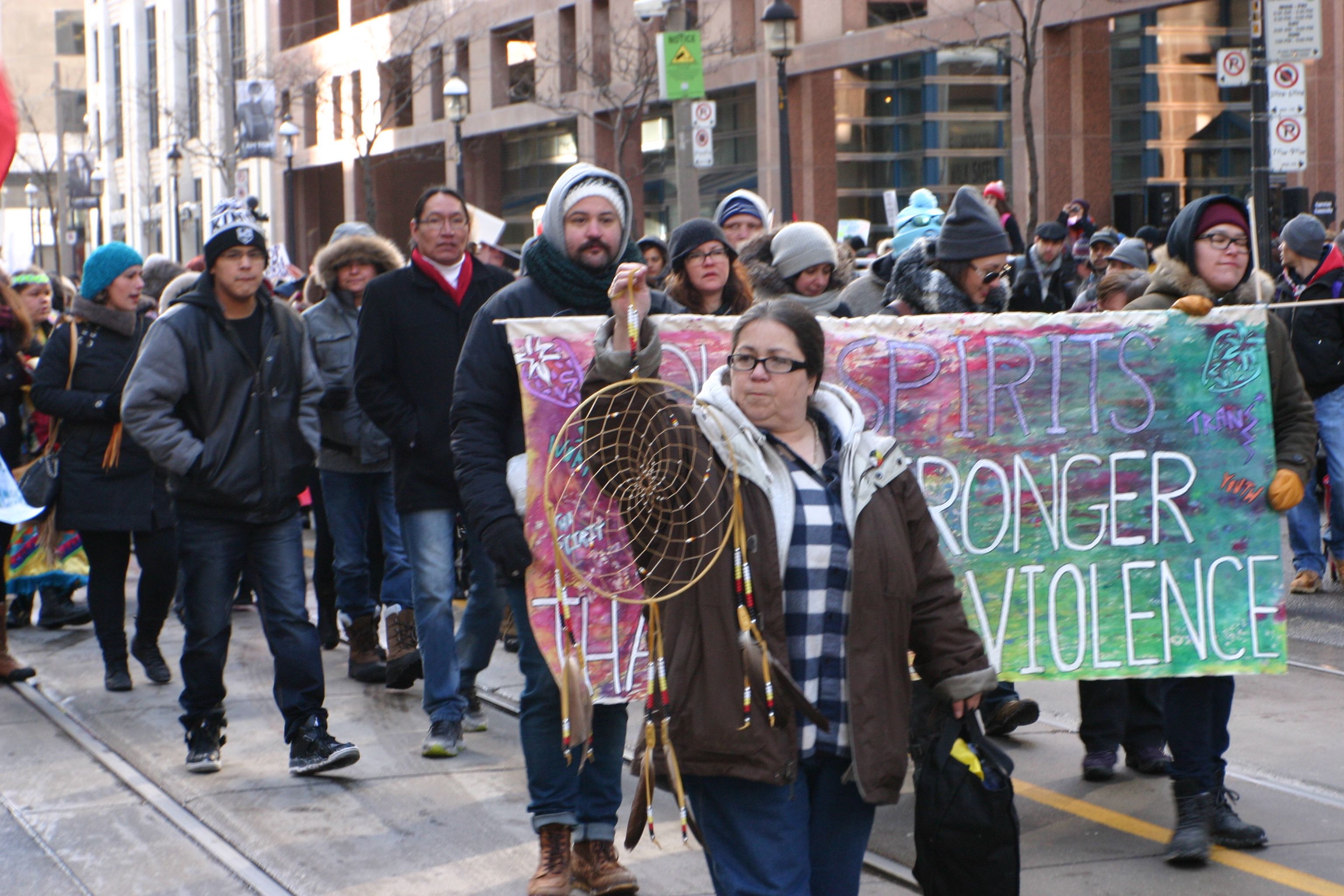Today is the World Day of Social Justice. You likely didn’t know that. For me, every day is this one. Every day I invite Canadians to look at the settler colonial project, alive and well today, to understand its impact on Indigenous peoples, particularly women in this country and worldwide.
No More Silence, a grassroots network of Indigenous women and allies, was founded about 10 years ago in Toronto to call attention to the impunity surrounding the ongoing disappearances of Indigenous women in Canada. We have worked hard to break the silence and today “the crisis of missing and murdered Indigenous women is a part of mainstream media and public consciousness.”
Unfortunately, this has not led to a decrease in the violence or to concrete measures on the part of the government. In fact, despite widespread calls for a public inquiry following the murder of young Innu scholar, Loretta Saunders, who was writing her thesis on the issue when she was killed in February 2013, the Government of Canada continues to refute the demands of family members and advocates.
This comes as no surprise as we understand the violence to be systemic and endemic to the settler colonial project. Impunity and state complicity are part and parcel of the process. It is for this reason that on this World Day of Social Justice, just like every other day, we reaffirm our commitment to rebuild our communities along with our relationship to the land that is Turtle Island. We do not look to the government for solutions but seek rather to build inter-generational relationships such as the partnership we initiated with The Native Youth Sexual Health Network and Families of Sisters In Spirit that resulted in the creation of a community-led database documenting and honouring our sisters, trans and two spirits who have died violent deaths.
Last November, I travelled with Rachel Warden, KAIROS Canada‘s Latin American and gender justice coordinator, to Colombia. It was an amazing opportunity for me to connect personally with KAIROS’ partner, Popular Feminist Organization (OFP), which has a long history defending women’s rights and human rights in the midst of war and turmoil. While the country is officially in a peace process, the armed conflict continues and the task the OFP has taken on — not only to support individuals seeking reparations and the implementation of the Victim’s Law — but also to put forward the demand for collective reparations is formidable. The organization’s stand on a process that includes truth, justice, reparations and the cessation of violence is unrelenting and I support their vision whole heartedly that truth without honouring and memorializing those who were disappeared is but a lie.
From sitting with family members of missing and murdered women and girls in Toronto I know the importance of honouring who their loved ones were, as aunties, mothers, grandmothers, daughters. We will neither forget nor reduce their lives to the grisly details of their passing. This is a mourning that must be made public despite efforts to silence, erase and displace those who are Indigenous, and to stand in the way of ongoing genocidal policies and destruction of the land, our mother.
Attending the OFP’s launch of their new book Repair for Peace on November 25 was impressive, but it wasn’t until I had the opportunity to sit with a woman whose 15 year old son was killed in 2005 in Antioquia that I felt deep in my heart the connection to home. We had travelled across the Magdalena Medio river on whose banks an oil refinery sits, through devastated land, to visit the community of Yondo and an OFP centre. Despite the Victim’s Law, that entitles Berta Ines Morales to monetary compensation, she has received nothing. But as other victims have said about their disappeared family members, it is not about the money. She will never get her son back and it appears not even the damages she is entitled to. Over and over she is told to wait. But the OFP isn’t waiting and neither is she.
The stories of the disappeared will be told, and not only that, those left behind will no longer be silenced. In fact, our meeting took place at the Casa de Mujeres, a centre that had to be abandoned in 2010 due to a resurgence in violence. The women of the community who continued to meet and organize clandestinely have not only reclaimed this space but also created six community gardens that produce food and are a source of pride for several families. This is one of 68 concrete demands that the OFP has put forward in their claim for collective reparations. A centre documenting human rights abuses and leadership training in legal advocacy are other measures that the OFP is working on. Fundamental to their work is the leadership of the victims and families most affected.
It has been great to reconnect with Rachel Warden who was present at one of No More Silence’s founding meetings and to see firsthand the great work of KAIROS’ partners. I’ve been inspired to think more creatively about how legal strategies can accompany our community capacity building and organizing, and look forward to exploring this further with Aboriginal Legal Services Toronto and the It Starts With Us team. At the end of day we will continue to take our direction from the family members and those most affected by the violence!
The OFP has been organizing for 42 years. We are a young organization with our meager 10 years, but our community has endured and survived colonization for hundreds. Resurgence is happening now and we will overcome!
Audrey Huntley is a Toronto-based community researcher and founding member of No More Silence. Audrey participated in the Strawberry Ceremony for Missing And Murdered Indigenous Women And Girls on February 14, 2015. City TV interviewed Audrey Huntley at the event.



